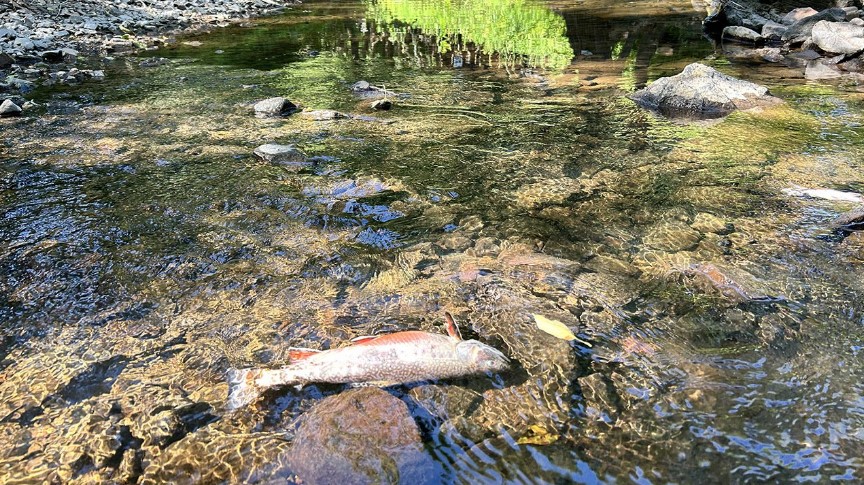Fish kill investigation shows 1.7 million gallons of chloraminated water drained from Duluth reservoir

Dead fish lie in Tischer Creek in Duluth, Minnesota, Aug. 5, 2024. They MPCA investigated the site after a report was made to the Minnesota Duty Officer about the release of about 500,000 gallons of city water from a reservoir July 31, 2024. More than 1,000 dead fish, including brook trout, were counted. (Photo by MPCA watershed ecologist Jeff Jasperson)
The Minnesota Pollution Control Agency released new information on Tuesday regarding its ongoing efforts to determine what caused a massive fish kill in Duluth’s Tischer Creek in August.
As reported by KSTP-TV’s sister station WDIO, MPCA Communications Specialist Beverly Godfrey says the city of Duluth drained an estimated 1.7 million gallons of chloraminated water into the creek from the Woodland Reservoir over a 15-hour period as part of a maintenance operation for the city’s drinking water system. According to the CDC, chloramines are a group of chemical compounds containing chlorine and ammonia.
In a previous report, the number was believed to have been a release of between 400,000 and 500,000 gallons of water by the city.
Godfrey said the water did not pose a threat to human health and well-being but did create conditions that were potentially toxic to fish and other aquatic wildlife.
Field crews collected invertebrate samples at five locations along Tischer Creek, which will help to determine the impact of the fish kill and the rate of recovery time.
The test results are expected to take several months to complete, but they will help inform future decisions about what can be done to help the creek recover.
WDIO was provided a statement from the city of Duluth, who said they are fully cooperating with the investigation:
The City of Duluth is fully cooperating with regulatory agencies conducting the investigation regarding the fish kill at Tischer Creek discovered on August 1.
In the course of a maintenance operation on a nearby drinking water reservoir, the City of Duluth discharged clean, potable drinking water into the stormwater sewer system, which then flowed into Tischer Creek. The City of Duluth would like to reaffirm that the water discharged into the stormwater system on August 1 was safe, clean, and potable for humans and house pets as it left the reservoir. Normal precautions should always be taken when swimming, bathing, or ingesting in natural bodies of water like Tischer Creek.
The City of Duluth will not have further comment in light of the ongoing investigation.